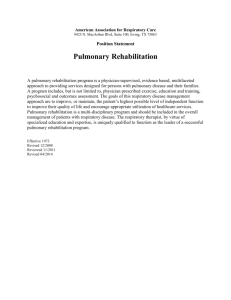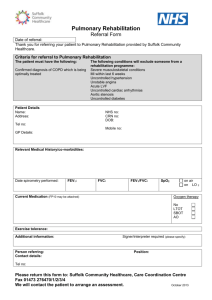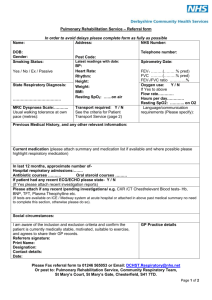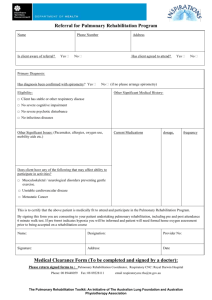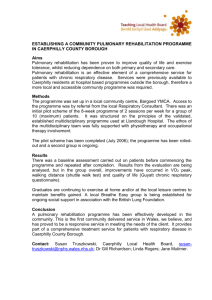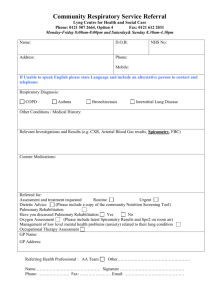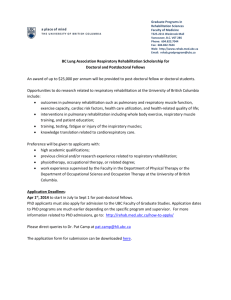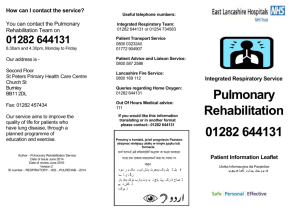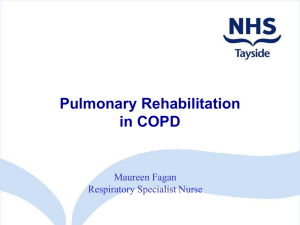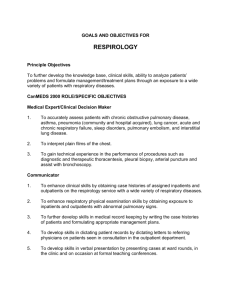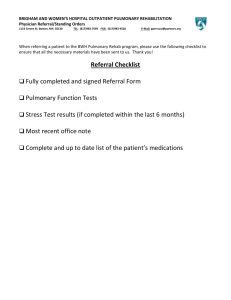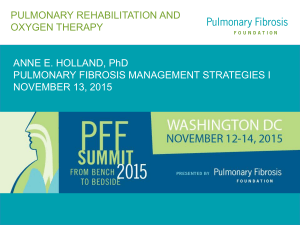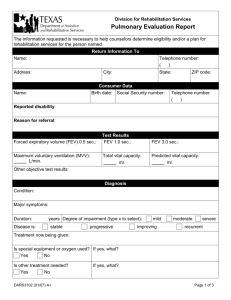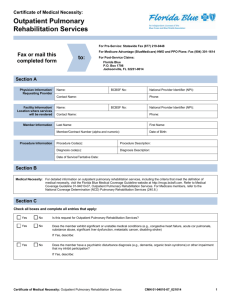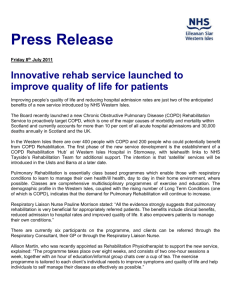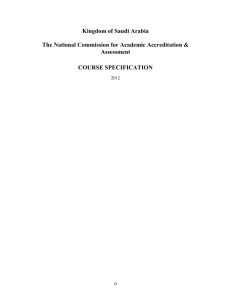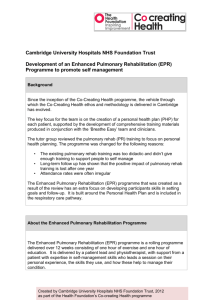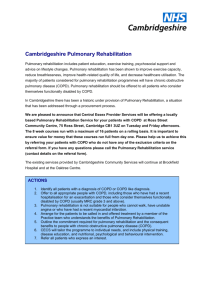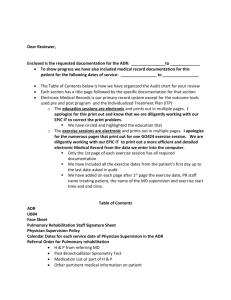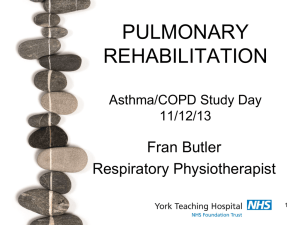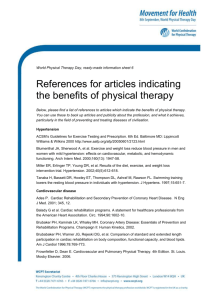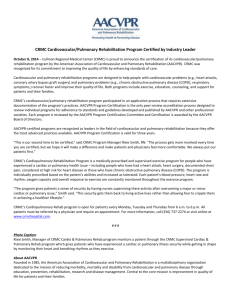Pulmonary Rehabilitation Service – Referral form In order to avoid
advertisement
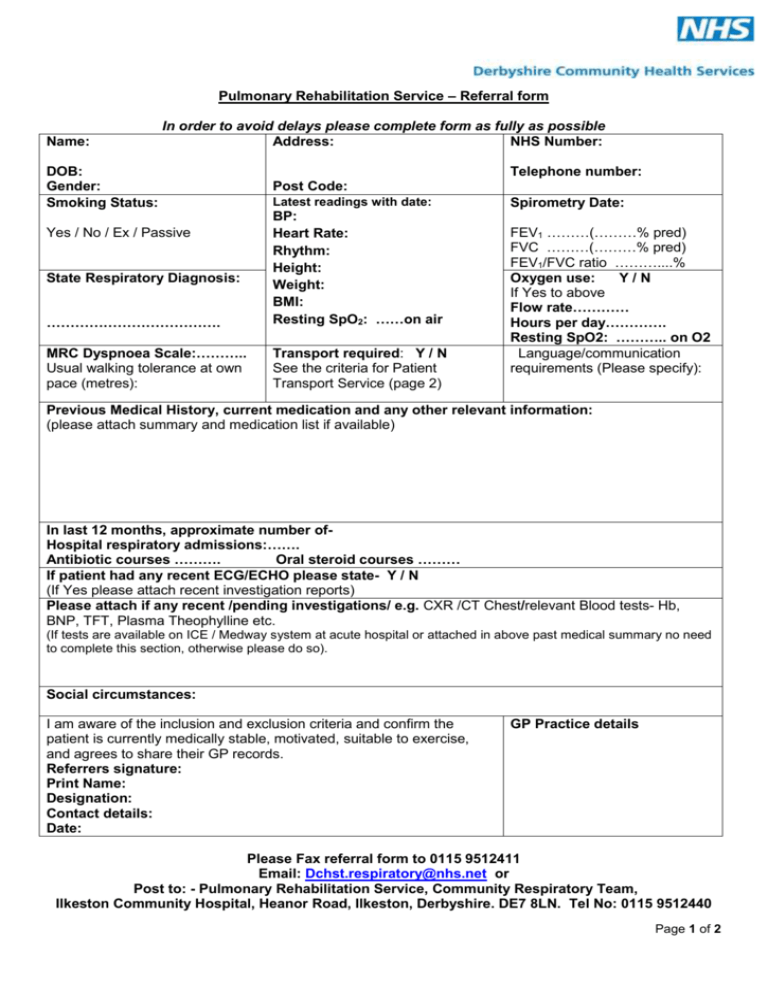
Pulmonary Rehabilitation Service – Referral form Name: In order to avoid delays please complete form as fully as possible Address: NHS Number: DOB: Gender: Smoking Status: Telephone number: Post Code: Latest readings with date: ………………………………. BP: Heart Rate: Rhythm: Height: Weight: BMI: Resting SpO2: ……on air MRC Dyspnoea Scale:……….. Usual walking tolerance at own pace (metres): Transport required: Y / N See the criteria for Patient Transport Service (page 2) Yes / No / Ex / Passive State Respiratory Diagnosis: Spirometry Date: FEV1 ………(………% pred) FVC ………(………% pred) FEV1/FVC ratio ………....% Oxygen use: Y/N If Yes to above Flow rate………… Hours per day…………. Resting SpO2: ……….. on O2 Language/communication requirements (Please specify): Previous Medical History, current medication and any other relevant information: (please attach summary and medication list if available) In last 12 months, approximate number ofHospital respiratory admissions:……. Antibiotic courses ………. Oral steroid courses ……… If patient had any recent ECG/ECHO please state- Y / N (If Yes please attach recent investigation reports) Please attach if any recent /pending investigations/ e.g. CXR /CT Chest/relevant Blood tests- Hb, BNP, TFT, Plasma Theophylline etc. (If tests are available on ICE / Medway system at acute hospital or attached in above past medical summary no need to complete this section, otherwise please do so). Social circumstances: I am aware of the inclusion and exclusion criteria and confirm the patient is currently medically stable, motivated, suitable to exercise, and agrees to share their GP records. Referrers signature: Print Name: Designation: Contact details: Date: GP Practice details Please Fax referral form to 0115 9512411 Email: Dchst.respiratory@nhs.net or Post to: - Pulmonary Rehabilitation Service, Community Respiratory Team, Ilkeston Community Hospital, Heanor Road, Ilkeston, Derbyshire. DE7 8LN. Tel No: 0115 9512440 Page 1 of 2 INCLUSION CRITERIA Confirmed chronic respiratory disease is the primary diagnosis (COPD/Non CF Bronchiectasis/ILD) On optimum drug treatment In the event of a recent admission, the patient’s medical condition is sufficiently stable to attend and participate in rehab sessions (to be confirmed on assessment by Pulmonary Rehabilitation Specialist Team) The patient is functionally limited either by breathlessness or fatigue. MRC Dyspnoea scale 3 or above. To be able to walk a minimum of 10 metres with or without a walking aid. Motivated to attend Pulmonary Rehabilitation and suitable for group work EXCLUSION CRITERIA De-motivated/lack of compliance Mental or physical impairment with inability to exercise e.g. dementia, severe musculoskeletal or neurological problems which limit mobility, falls Any serious cardiac event in the last 6 weeks Other cardiac pathology including: unstable angina, acute LVF, uncontrolled cardiac arrhythmias, uncontrolled hypertension (either ≥ 180 systolic or ≥ 100 diastolic mmHg). Severe symptomatic stenosis: aortic, left main coronary or stenotic valvular heart disease. Symptomatic heart failure. Suspected or known aneurysm, Hypertrophic obstructive cardiomyopathy. Active or suspected myocarditis or pericarditis If the patient is undergoing investigations or is under the care of a cardiologist, permission needs to be sought directly from the specialist as to whether the patient is suitable to attend Pulmonary Rehabilitation H/o of Abdominal aortic aneurysm (AAA) with unstable BP Patient should not have attended a Pulmonary Rehabilitation Programme within the last two years. However patients can be re-referred within 2 years if their clinical condition deteriorated due to repeated exacerbations or if additional benefits on a shorter timescale would be clinically valuable (for eg. Preoperative Lung Transplantation). It is unlikely that if the patient completed the pulmonary rehabilitation course originally and failed to gain a benefit, that they would benefit a second time round; unless circumstances such as an exacerbation/health issues interrupted the initial programme Active cancer undergoing acute treatment Uncontrolled metabolic disease Febrile illness, chronic infectious diseases Recent systemic or pulmonary embolism or thrombophlebitis CONTENT The Pulmonary Rehabilitation Programme runs twice weekly, for 6 consecutive weeks. Each session is 2 hours long. The course involves supervised exercise and education sessions to aid self-management, relevant to chronic respiratory condition. The Patient will also be given an exercise programme to be continued independently at home. There is an expectation that the patient will attend every session and follow a daily home exercise plan in order to gain maximum benefit from the course. Please inform the patient of the outline of the course Patient Transport Service (PTS) Criteria: Clinically stated medical need that prevents patient using private or public transport, and no relatives or family members available/able to support patient to the appointments Have a diagnosed disability (physical and or psychological) which makes them medically unfit to travel by any other means, and who have no alternative method of travelling to or from the hospital/clinic (Escort will be provided by transport staff for the patient’s medical condition that he/she requires constant supervision for safety). Page 2 of 2
